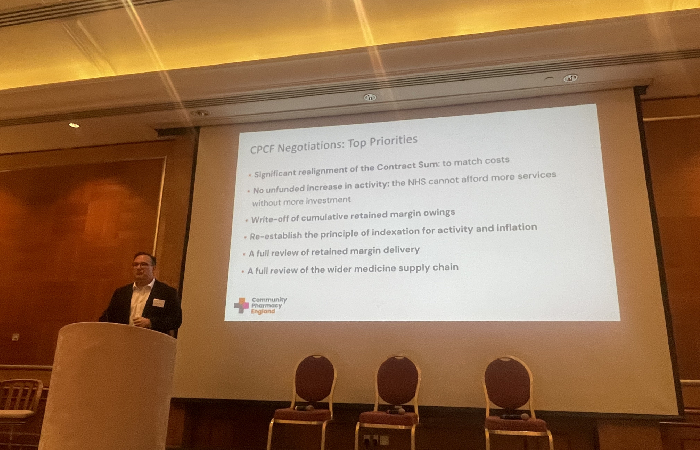Avicenna conference: Fix funding first, says Buxton
In Business news
Follow this topic
Bookmark
Record learning outcomes
Community Pharmacy England has outlined a wide range of service enhancements it wants to prioritise in its negotiations with the Government – “but the underpinning funding has to be fixed first”, director of NHS services, Alastair Buxton, told Avicenna’s Heathrow conference held on September 8.
“We are in a dire state as a sector and we need to get the new Government to change its approach. I think we are starting to see progress,” he said.
CPE wants to expand the “strategically important” Pharmacy First scheme to include conditions such as lower respiratory tract infections, acne and eczema. It is also calling for “open access” to the service and for OTC medicines to be supplied to low-income individuals.
New prevention, public health and women’s health services should also be part of the contractual framework, he said.
The negotiations on a one-year deal for 2024-25, delayed by the general election, are expected to start soon, Mr Buxton added.
“As a new government, they are looking for solutions – but they’ve got to fix the funding,” he told delegates. “We have shown that we are keen as a sector, once the funding is sorted out, to do more.”
Many of the problems facing pharmacy originated with the old administration, he said. “We do need to give the new Government a chance to find some funding and make good on their promises to make greater use of pharmacy. But the service needs to be funded properly.”
The idea of providing more services within a constrained global sum, no matter how valuable to patients and the NHS, while actually being paid less, “is just bonkers”, he said.
He suggested that CPE “would need to think about all the options” should negotiations fail to progress as hoped, including the possibility of some form of collective action, as is currently happening with GPs.
On Pharmacy First, Mr Buxton said the service had been “an amazing success” with over a million clinical pathway consultations delivered so far. However, the ability of contractors to reach the monthly payment thresholds is “a major concern”. Disappointing numbers of GP referrals and lack of public awareness are “big problems” and the thresholds “not realistic”, he felt.
“We need GPs and NHS England to do more,” he said. “Our great concern is that contractors walk away from the service if they are unable to meet the threshold for the £1,000 monthly payments.”
The threshold number of consultations is currently 20 this month (September) and rises to 30 in October. CPE wants this figure to be reduced “but we seem to be pushing against a closed door at the moment”.
The negotiator has said that it wants Pharmacy First funding to be included within the core contract. Mr Buxton pointed out that the initial two-year £645m funding package for the service is by no means guaranteed.
NHSE is clear that if pharmacies earn the money, they keep it, but it is not pharmacy’s money – whereas the negotiator sees it as funding that should be spent on community pharmacy regardless, he said.
“I think we all recognise that the £645m is unlikely to be spent in total,” he added. CPE is continuing to push in negotiations for any leftover Pharmacy First money to write off fee over-deliveries.

